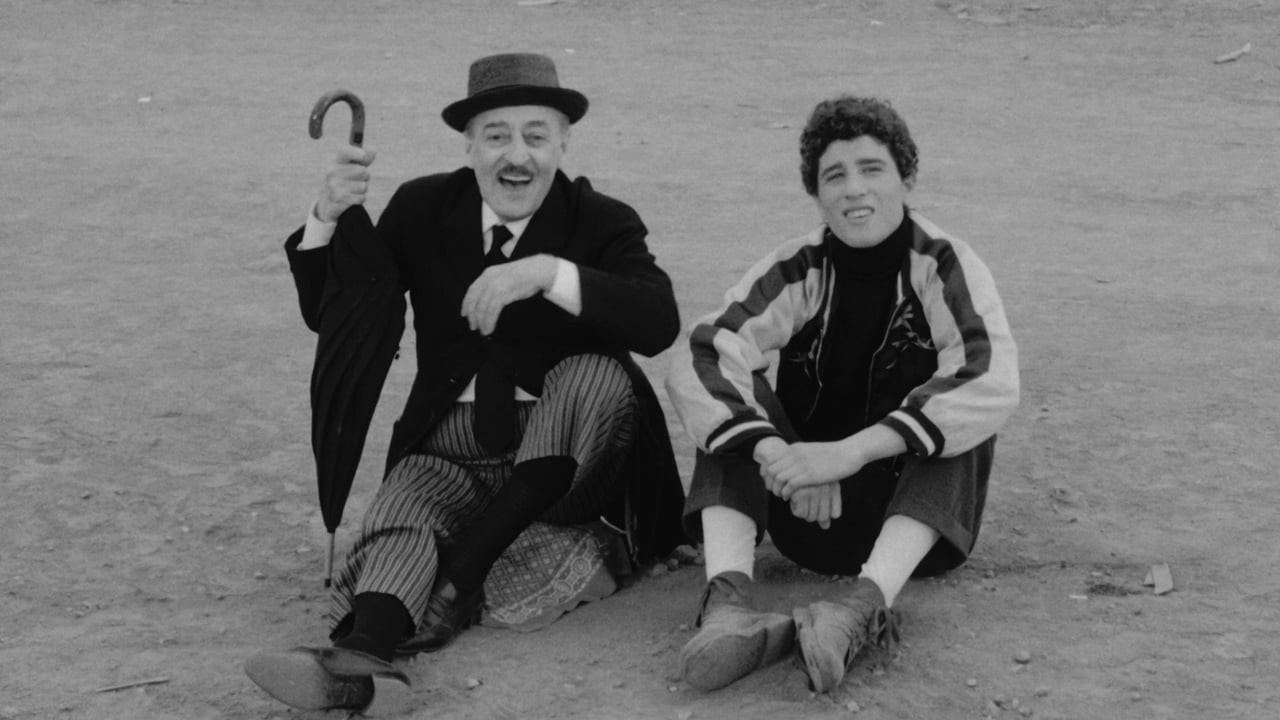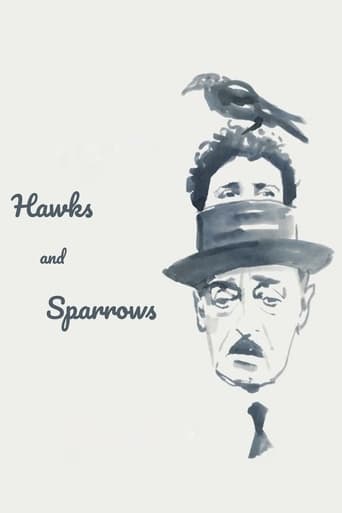

'Hawks and Sparrows' is the most Buñuel of Pasolini's early films in both mischevious tone and religiously subversive subject matter. The film even hints at Surrealism as much as it does Marxism, featuring a talking raven (described as a 'left-wing intellectual'), which is clearly an avatar for Pasolini, and a quarrel of hungry pagan sparrows that are converted to Christianity by monks with the lure of food.It is very light-hearted and comedic on the surface but this is dangerous, confrontational art when you understand the symbolism, the kind of filmmaking that made Pasolini many enemies. Both Italian film legend Totò and young Ninetto Davoli are excellent and have enjoyable chemistry together, the rest of the cast is mostly made up of neorealist non-actors.
... View MoreThis richly symbolic film is really impossible to understand without some knowledge of 20th Century Italian history, and particularly the power of the Roman Catholic Church. The Lateran Treaty of 1929 finally politically separated Italy from Church power by creating the Vatican as a sovereign state. But the trade off was the that the Church was still left in power over many aspects of everyday Italian life. For instance, Italy finally established a civilian divorce law through a bitterly contested 1970 referendum. Before then, divorce was under strictly in the domain of Church law, and the Church NEVER granted a divorce, even in extreme cases like when a spouse was abandoned many years hence. Overall, however, the power of the Church still resided in the blind allegiance of Italians at all levels to Church morality. Over decades, this led to impeding Italy's social and political progress, and greatly maintained the status quo in the division between the privileged upper class & the downtrodden masses. The Leftist & Communist movements that began after WWII battled against this status quo, and indirectly against the Church through Progressive agendas. ALL This doesn't even amount to an adequate thumbnail of all the issues that this film touched upon. Pasolini really needed to couch this head-on criticism of contemporary Italian society in a comedy, because I suspect that at some level he would have feared for his life had he delivered a more serious work covering the same controversial topics. ... [email protected]
... View More"Uccellacci e uccellini" aka "The Hawks and the Sparrows" (1964) - directed by Pier Paolo PasoliniThis is a movie that begins like no other introducing the cast and the crew in the manner that is charming, original, melodious and promising of even better things to follow. The fun begins actually with its Italian title, "Uccellacci e uccellini". I don't know about you but the sound of the title simply makes me smile, it sounds like the birds themselves whispered or chirped it to the Pasolini's ear. It is possible to make a satirical philosophical fable concerned with the serious and even grave matters as religion, social and political systems and the order of things and at the same time highly enjoyable, often hilarious, sometimes sorrowful, always original, in one word -Pasolinesque. "Uccellacci e uccellini" talks about desires, death, the meaning of life, Christianity, and Marxism but first and foremost, it entertains. It is about a father (Italian clown Toto) and his young and naive son (Nino Davoli) whom Pasolini sends to the endless cyclical journey on the road of life where they soon will be joined by a talking crow, will be catapulted 750 years back in time and by the request of ST.Francis, they would become two saints (Toto with his clown's face makes a great saint) who would teach the birds (the hawks and the sparrows) the word of God, in the birds' language, of course. The birds seem to agree and accept the words of love but as we know the love comes and goes but everyone (including birds) has to eat and the hunger does not help to improve the understanding between the hawks and the sparrows and between the humans and the crows, even the talking crows. Some were born to kill and to eat the others and there is not much could be changed about it. Two men will be magically returned back to the present time, will go to funeral, will see the baby born, will meet a beautiful desirable girl named Luna who reminds them how divine the fresh hay smells and how much fun it is to make love in it... Their journey would end where it began and on and on and on they go around the world in circles turning. As for the talking crows, "Takers and fakers and talkers won't tell you. Teachers and preachers will just buy and sell you. When no one can tempt you with heaven or hell- You'll be a lucky man!"
... View MoreInnocenti Totò (Totò) and his son Innocenti Ninetto (Ninetto Davoli) are drifting in a road in Italy, when they meet a Marxist speaking crow. The trio travels together in a long journey, but when hunger increases, the crow is simply eaten by the drifters."Uccellacci e Uccellini" is an original and critical surrealistic fable about the fate of the leftist ideology in the view of Pasolini. Although dated, the lead story is good, using the successful style of road-movie of the 50's explored by other Italian directors, like Fellini or Rossellini; but like a machine gun, Pasolini shots everywhere making the plot diffused, confused and sometimes boring. Totò has good performance, but Ninetto Davoli in his debut is very silly, with a forced smile on his face. The DVD released in Brazil by the minor Brazilian distributor Mediagroup is surprisingly good, presenting restored image and having lots of extras inclusive a documentary of 28 minutes running time about Pier Paolo Pasolini. There is a mistake in the Audio Menu: the 5.1 option shows indeed the movie with comments in Italian. But this minor mistake does not diminish the value of the Brazilian DVD. My vote is five.Title (Brazil): "Gaviões e Passarinhos" ("Hawks and Sparrows")
... View More